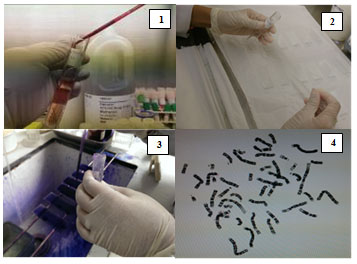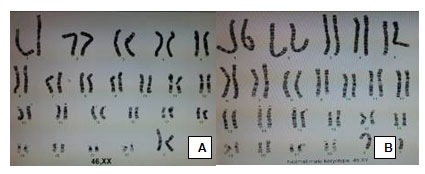Cytogenetics is the field of studying chromosomes structure and composition. For diagnostic purposes, cytogenetic test is able to detect abnormalities of human chromosomes’ gross structures and counts. Cases that are relevant to cytogenetic testing include
- Ambiguous Genitalia
- Newborns with birth defect
- Dysmorphism
- Infertility
- Mental Retardation
Patients’ samples for cytogenetics test can be obtained from the peripheral bloods.
Chromosomes used in cytogenetic test are obtained from T-lymphocytes. On arrival of the blood to the lab;
- Blood will be culture in a nutrient media that promotes that growth of T-lymphocytes. These cultures were kept at 37 ºC for three days, to ensure optimum cells divisions and growth. After 3 days, cell culture were harvested to isolate T-lymphocytes from other cells of the blood and used for the next stage.
- In slide preparation, droplets of T-lymphocytes cell suspension will be dropped on slides. Slides were then dried for minimum of 3 hours at 65°C or overnight at room temperature. Slides then soaked in Hydrogen Peroxide solution to ensure optimum ageing that is crucial for the chromosomes staining process next in the step.
- Slides that have undergone ageing process are exposed to solution of 0.2% trypsin and Leishman solution to stain the chromosomes. Exposure to 0.2% trypsin solution will break hydrogen bonding in DNA molecules, allowing Leishman to stain the molecules.
- Slides were than dried, mounted and screened for metaphase spreads of chromosomes to be captured for analysis.
Karyotype & Analysis
Firstly, the chromosomes present in each cell (metaphase spread) is counted, and followed by a careful examination of banding pattern for individual chromosome. Chromosomes and its composition are compared to a normal standard structures accepted in the diagnostic field, An International System for Human Cytogenetic Nomenclature. At the end of the process, an image of the arranged chromosomes for each cells are produce. This image is called a karyogram, and the chromosome composition is often referred to as a karyotype.
A normal human chromosome composition (also called a karyotype) has 46 chromosomes including 2 sex chromosomes. Hence, the normal karyotype for a female is 46,XX, ( figure 2(a) ) and for a male is 46,XY (figure 2(b)).
Common Disorders Detected By Cytogenetics Test
Most common disorders that are usually detected in cytogenetics test include;
- Down SyndromePatient with Down Syndrome has three chromosome 21, which also called as trisomy 21. Karyotype for these patients read 47,XX,+21 for females and 47,XY,+21 for males./
- Patau Syndrome.Patient with Patau Syndrome has three chromosome 13, which also called as trisomy 13. Karyotype for these patients read 47,XX,+13 for females and 47,XY,+13 for males.
- Edwards Syndrome.Patient with Edwards Syndrome has three chromosome 18, which also called as trisomy 18. Karyotype for these patients read 47,XX,+18 for females and 47,XY,+18 for males.
- Turner Syndrome.Patient with Classical Turner Syndrome has only one chromosome X. Patients karyotype hence read 45,X.
| Last Reviewed | : | 02 January 2017 |
| Writer | : | Nuur Amalina Amirah bt. Ghazali |
| Accreditor | : | Aminah bt. Mekesat |









